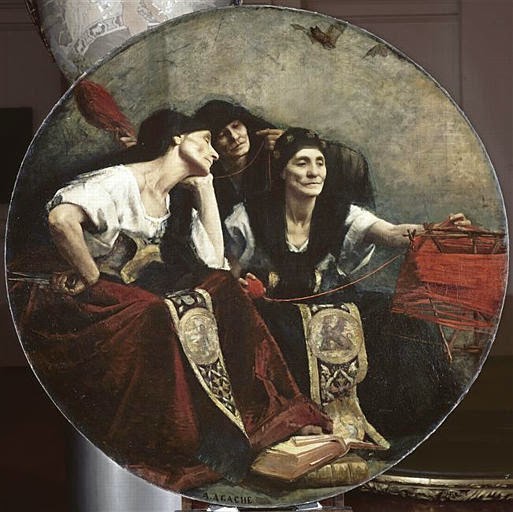| XLVII. | To comfort her, some reasons full of grace, Sage and devout the approaching hermit cites: And, now his hand upon her moistened face, In speaking, now upon her bosom lights: As her, securer, next he would embrace: Him, kindling into pretty scorn, she smites With one hand on his breast, and backward throws, Then flushed with honest red, all over glows. |
| XLVIII. | A pocket at the ancient’s side was dight, Where he a cruise of virtuous liquor wore; And at those puissant eyes, whence flashed the light Of the most radiant torch Love ever bore, Threw from the flask a little drop, of might To make her sleep: upon the sandy shore Already the recumbent damsel lay, The greedy elder’s unresisting prey. |
| XLIX. | (Stanza XLIX untranslated by Rose) |
| L. | (Lines 1-2 untranslated by Rose) Hopeless, at length upon the beach he lies, And by the maid, exhausted, falls asleep. When to torment him new misfortunes rise: Fortune does seldom any measure keep; Unused to cut her cruel pastime short, If she with mortal man is pleased to sport. |
Why, what's that? Stanza XLIX (and a few lines of the sequel) of Canto VIII is untranslated by Rose?
Really?
How tantalizing.
Did anyone else translate it?
Not to my knowledge.
So I grabbed the Italian text and got to work.
Here are my translations of the bits Ariosto probably had a blast writing while centuries later would give Rose a heart attack:
| XLVII. | To comfort her, some reasons full of grace, Sage and devout the approaching hermit cites: And, now his hand upon her moistened face, In speaking, now upon her bosom lights: As her, securer, next he would embrace: Him, kindling into pretty scorn, she smites With one hand on his breast, and backward throws, Then flushed with honest red, all over glows. |
| XLVIII. | A pocket at the ancient’s side was dight, Where he a cruise of virtuous liquor wore; And at those puissant eyes, whence flashed the light Of the most radiant torch Love ever bore, Threw from the flask a little drop, of might To make her sleep: upon the sandy shore Already the recumbent damsel lay, The greedy elder’s unresisting prey. |
| XLIX. | Embraces her and touches her with lust And slumbers she, the dame, and cannot shield. Now a kiss upon lips, now beauteous bust; None there vigil keeps in that harsh field. But not this fumbling makes his charger thrust Though he desires, his body old age yields: An ill act, for he has so many years; More his exertions, the worse all appears. |
| L. | Ev’ry which-way, ev’ry manner he tries But that lazy nag however doesn’t leap. Hopeless, at length upon the beach he lies, And by the maid, exhausted, falls asleep. When to torment him new misfortunes rise: Fortune does seldom any measure keep; Unused to cut her cruel pastime short, If she with mortal man is pleased to sport. |
This one is pretty good:
LXIV. “'Scarce my demand was made, before mine eyeLXV. “‘And even if that did not seem strange anew,
Beneath the lymph engulphed that lady viewed:
Nor answered she my prayer, but, for reply,
Me with the enchanted element bedewed;
Which has no sooner touched my face than I,
I know not how, am utterly transmewed:
I see, I feel—yet doubting what I scan—
Feel, I am changed from woman into man.
You are able to explain, nor wouldn’t trust:
Into another sex, and hitherto
I have my wants, swift obey you I must.
Ye command these sure, which just now I grew
And evermore for you watchful and robust.’
Thus I spoke; and made herself by feeling
To find with her hand that truth revealing.
LXVI.
Come interviene a chi già fuor di speme Just as a man comes already hopeless
di cosa sia che nel pensier molt’abbia, About a thing he might have thought much
che mentre più d’esserne privo geme, He groans, lacking more life
più se n’afflige e se ne strugge e arrabbia; Unless more he grieves nor droops and angers;
se ben la trova poi, tanto gli preme if well he finds it then, much him squeeze
l’aver gran tempo seminato in sabbia, He has sowed a long time in the sand
e la disperazion l’ha sì male uso, and the despair has him yes evil used
che non crede a se stesso, e sta confuso: which does not believe to himself and remains confused.
LXVII. “So then the lady touches and perceives
What have I become, such desire she keeps
To her eyes, to her touch, herself not believes
And remains doubtful, still she does not sleep;
And must prove it true for faith not deceived,
So she may feel those senses she might reap.
‘O God, (spake she) if merely dreams are these
I fain sleep endless, awake would displease.’
LXVIII. “There was no sound of some drums or of horns
As I began for an assault of love.
My kisses either height to scale or mourn
They grant a sign which likens unto doves.
Other arms than darts or fire by me borne.
I, without scale, onto walls leapt above
And plantéd the standard there with one jab
And her, my enemy, beneath me stabbed.
LXVIX. “The night before us, in that bed we dwelt,
Full of soft sighs and grave complaints it teems
She never before then has more felt
Laughter, feasting, rejoicing, gentle themes.
With no more nodes does the acanthus svelte
In columns are inscribed and in beams
Than those with which we tight together prest,
Our necks, our thighs, our arms, our legs, and breasts.
LXX. “The thing remained concealed between us two;
So that our bliss endured some months; at last
We were espied; and, as I sorely rue,
The tidings to the Spanish monarch past.
Thou that whilere preserved’st me from the crew,
Which me into the flames designed to cast,
By this mayst fully comprehend the rest;
But God alone can read my sorrowing breast.”


TRN.png)

1.png)
.png)



.jpg)



.jpg)








